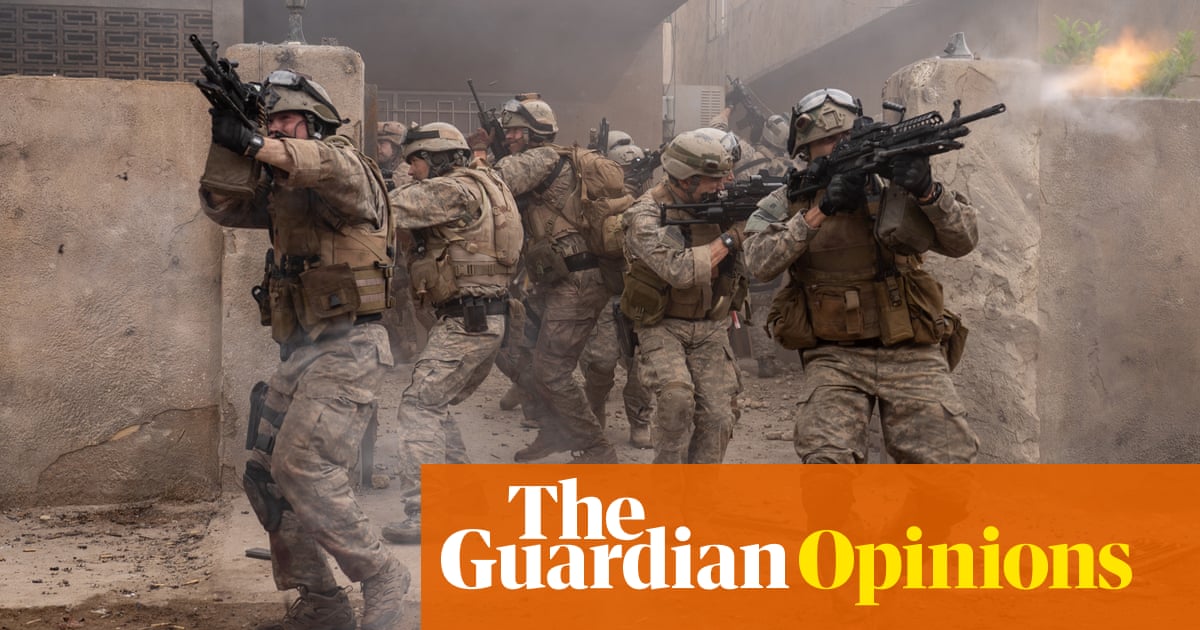Think back to 2006.Iraqwas at the peak of its conflicts. A horrific sectarian war was raging, and al-Qaida in Iraq and other insurgent groups, both Sunni and Shia, held sway in substantial areas of the country.
Suicide bombers and IEDs were a daily occurrence targeting both Iraqis and foreign forces, and in cities and towns from Fallujah and Ramadi, to Baqubah and Mosul, US troops were engaged in urban warfare. It was as much about ambush and hit-and-run attacks as about formal battles.
Alex Garland’s new film Warfareis a re-enactment of one of these clashes – the final days of the battle of Ramadi. Garland and his co-director, former US Navy SealRay Mendoza, who fought during the engagement, have made much of their desire for authenticity. Their film is based, they say, as accurately as possible on the memories of those involved.
Its aim, they have suggested, is to provide as immersive an experience of combat as possible for audiences with no grasp of the reality of conflict.
In some senses, it succeeds. Warfare is a film that captures the essence of the Iraq of almost 20 years ago, down to minute details including the furnishing of the Iraqi house where much of the action takes place.
The Navy Seal team who are its focus are inserted into Ramadi after dark, occupying several houses to provide sniper support for Marines operating nearby in the city. A sense of mounting risk is brilliantly conveyed. The violence, when it occurs, is unexpected and shocking, for all that it is anticipated.
While the seriesGeneration Kill, depicting the 2003 invasion, dealt with fast and mobile fighting, Warfare is defined by the claustrophobia that permeated the later war. Soldiers were trapped in vehicles threatened by the ever-present roadside bombs, trapped in outposts under mortar fire or holed up in the houses seized in hostile territory by the “small kill teams”.
The consequences of the violence are portrayed unsparingly, including what it means to be around those who are badly wounded, inspiring a kind of collective shock.
Garland is also clever in using the technological trappings of modern war. He shows us the battlefield sensor systems I first encountered in Iraq, ghostly renderings on which you could see the body heat of approaching insurgent fighters, piped into combat computer systems from drones and other cameras.
But where Warfare is unsuccessful is when it falls into traps of its own making. If its overarching message is to emphasise a pointless exchange in a pointless war, Garland’s artistic choices left me wondering at the purpose of the film. For while Garland and Mendoza have made much of its realism, Warfare covers little new ground in its depiction of violence.
Every generation of film-makers has thrown up those wanting to show a version of war “as it really is”, from Francis Ford Coppola’s shocking visual metaphor of sacrifice at the conclusion of Apocalypse Now, to Steven Spielberg’sbloody landing scene in Saving Private Ryanand Sam Peckinpah’s stylised mayhem inCross of Iron. All of those, however, were far more conventional films that sought to engage viewers with relatable characters and storylines.
The problem with documenting or representing war, as it is experienced at the most visceral level by those who fight in it, is that it is essentially a fool’s errand. Proximity to violence, contrary to the famous dictum ofRobert Capa, that most celebrated of war photographers, does not necessarily add value or clarity of meaning. Instead, like zooming in on a digital picture, it has the tendency to break into individual pixels. Meaning falls apart. Though this film is determined to plunge the viewer immediately into the experience, we learn almost nothing of the soldiers, their motivations, their personal attachment or the conflicts within the unit.
And this reflects a second, perhaps more serious, set of problems with Warfare. The solemn reverence for the integrity of the subject matter – the soldiers, and the recollections of the soldiers who fought in the engagement – leads to a kind of censorship by default. Largely missing from the picture are not only the Iraqis of Ramadi, where insurgents are seen as flitting figures and the civilian family in the house as a voiceless inconvenience, but any sense of how the soldiers view them.
The reality is that many of the US soldiers I and other journalists encountered were frequently racist about Iraqis. And unlike the taciturn soldiers in Warfare, their views, for better or for worse, and their rationalisations for being in Iraq were often articulated even in situations of extremis.
All of which leads to a final issue. In the decision not to articulate or aim for a wider parsing of a controversial and unpopular war, Garland excludes the possibility of any Iraqis in the film appearing as fully realised. The absence of Iraqis means that the war is merely something thathappensto these American soldiers. It is an experience to be endured and nothing more. The film’s sympathies may be anti-war but in its exclusive interest in the suffering of its young American protagonists, its viewpoint is colonial.
And as artists who have successfully conveyed their vision of what they believe conflict means have long understood – from Homer and Tolstoy to Erich Maria Remarque and Joseph Heller, to Spielberg and Coppola – war is an activity that occurs in a human context. Separated from that context (and to steal from the title ofDavid Axe’s graphic novel and website), war is boring. It really is.
Peter Beaumont is a senior international correspondent for the Guardian. He reported extensively from Iraq between 2003 and 2007, winning the Orwell prize for his coverage
Do you have an opinion on the issues raised in this article? If you would like to submit a response of up to 300 words by email to be considered for publication in ourletterssection, pleaseclick here.
